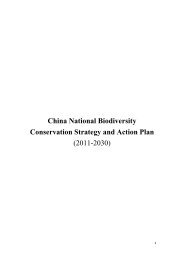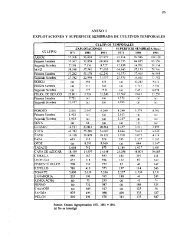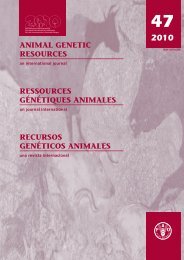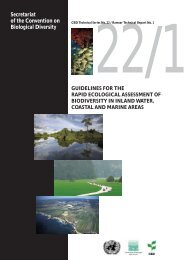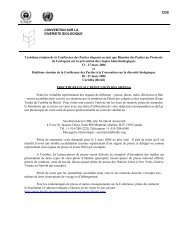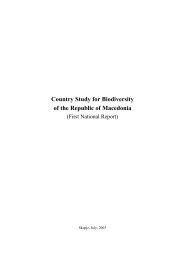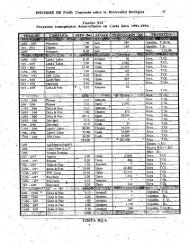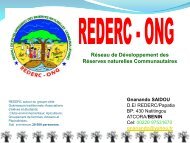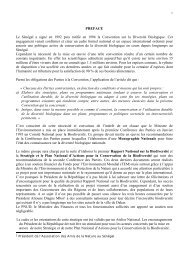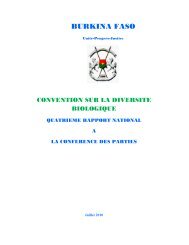CBD Fourth National Report - Azerbaijan (English version)
CBD Fourth National Report - Azerbaijan (English version)
CBD Fourth National Report - Azerbaijan (English version)
You also want an ePaper? Increase the reach of your titles
YUMPU automatically turns print PDFs into web optimized ePapers that Google loves.
Country Study on Biodiversity and <strong>Fourth</strong> <strong>National</strong> <strong>Report</strong><br />
The Republic of <strong>Azerbaijan</strong><br />
used pesticides which decompounded lately, hardly solved in water, had toxicity and<br />
hazardous for human and wildlife, caused to pollution of the environment.<br />
At the present, usage of more than 100 pesticides recorded at state registration is permitted in<br />
<strong>Azerbaijan</strong>. Import and sale of pesticides were implemented on the basis of special permit<br />
(licence) up to 2002. But after cancellation of licences multiple unregistered toxical pesticides<br />
are delivered and it should be prevented categorically in governmental level.<br />
On the other hand, new biological and other prevention methods must be priority in order<br />
gradually minimize chemical prevention methods.<br />
As many states (Iran, Turkey, Russia Federation, Georgia and etc.) of the world situated in<br />
border with geographical location of <strong>Azerbaijan</strong>, quarantine features of the imported<br />
vegetable (phytogenous) foodstuffs, seed and saplings which have special hazard and are not<br />
characteristic for <strong>Azerbaijan</strong>, should be prevented and phyto-sanitary measures should be<br />
carried out.<br />
Adoption of relevant statutory documents on status in delivery, use and sale of pesticides<br />
would be deemed expedient.<br />
In spite of the existing difficulties, there produced 103625 tons of corn including maize grain<br />
on agricultural entities of all categories of Nakhichevan Autonomous Republic in current<br />
year. Average 28.3 centner product was output of per ha.<br />
In current year (2009) output of several key agricultural products by producers in view of<br />
demand of domestic market is as follows. So that 37423tons of potato, 63627 tons of<br />
vegetable, 39583 tons of truck crops, 37782 tons of fruit, 13790 tons of grape, 15783 tons of<br />
sugar beet and 4.0 tons of tobacco were produced. In Nakhichevan Autonomous Republic,<br />
as elsewhere in <strong>Azerbaijan</strong>, recent land reform has had significant impacts on agriculture,<br />
resulting in upturn in this sector. Over 99% of agricultural output is now produced by the<br />
private sector. In 2000, agricultural products were worth 269 billion manats, which was<br />
29.6% higher than the previous year. As a result of internal markets, production was<br />
increased for almost all products, apart from tobacco for which production fell by 81%<br />
between 1999 and 2000. Livestock numbers have also risen. Despite a drought in 2002<br />
agricultural output remained high 38 . In 2001, 15,724 ha of land were under cultivation (an<br />
increase of 46% on 1999), and productivity of this land also increased over this period,<br />
particularly in terms of grain production. However, one identified threat to ongoing<br />
production is the spread of a number of weed species, and measures are needed to prevent<br />
their further expansion. Weeds are also invading a number of pastures and hayfields,<br />
associated with their over-use and degradation, and some of these weeds are poisonous to<br />
livestock. As elsewhere in <strong>Azerbaijan</strong>, Nakhichevan relies on irrigation systems to support<br />
intensive agriculture, and much of the irrigation infrastructure is in a poor state of repair.<br />
Salination contributes to land degradation and the change in grassland communities to more<br />
salt-tolerant forms.<br />
Limited access to pastures results in overstocking (with densities of up to 150 head/ha), and<br />
privately owned flocks from villages are often pastured freely on communal land, with little<br />
awareness of regulated use, resulting in trampling of vegetation, erosion, change in plant<br />
communities and destruction of natural habitats.<br />
38 Agricultural output in 2002 included 54,428 tonnes of grain, 13, 454 tonnes of potatoes, 42,723 tonnes<br />
of vegetables, 33,567 tonnes of melons, 28,444 tonnes of fruits, 14,015 tonnes of grapes, 45,499 tonnes<br />
of sugar-beet and 28,200 tonnes of tobacco were produced<br />
85<br />
2009



